Project Cargo Transport
Projests : Hospital/Forest Preservation/Water Supply Project
Afghanistan
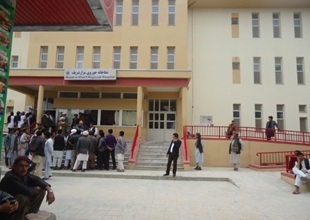
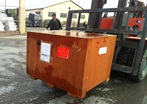
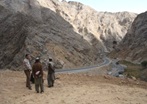
In Afghanistan, the impact of long-term civil war has crippled insurance and medical infrastructure. As a result, the country has the lowest life expectancy, high infant mortality and maternal death rates in the world. Today, there remain numerous regions with no medical or insurance services.
This project was expected to improve medical diagnosis and treatment services by providing medical equipment to a prefectural hospital located in the northern region of the country.
There also were expectations that this project would improve the system of referring and transporting patients to appropriate medical facilities for the approximately six million people living in the region where the hospital is located.
As this project would become a major transit endeavor between Pakistan and Afghanistan, it required sufficient understanding and completion of tax exemption procedures related to a wide range of medical equipment as well as secure and smooth domestic transport for the equipment. The former required that we compile tax exemption documents required under the respective tax exemption laws applied by supervisory authorities in both Pakistan and Afghanistan. The latter required that we conduct route and site surveys in advance to identify and resolve problem points. For travel through particularly high-risk areas, in addition to government-certified security teams we also directly assigned local support representatives to ensure maximum security. As a result, all phases of the transport project were a complete success.
Malawi/Cameroon
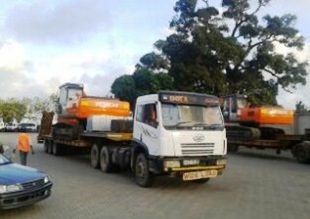
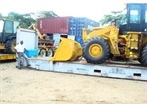

At the Davos meeting held in Switzerland in 2008, former Prime Minister Fukuda announced the establishment of the “Cool Earth Partnership,” a financial mechanism for supporting measures against climate change in developing nations. The partnership aims to support strategies (forest protection, disaster prevention, measures against climate change-related environmental disasters such as drought and flooding, constraining climate change through greenhouse gas emissions proposals (better power generation efficiency)) to combat global warming in developing nations, which are vulnerable to climate change. This partnership served as the platform for Japan’s Program Grant Aid for Environment and Climate Change.
Since then, the Japanese government has implemented numerous ODA programs in this segment. In the area of transport, we have been involved in numerous ODA projects targeting various developing nations, including countries in Africa, South America, and the Pacific. Below are examples of our involvement in the transport services for these projects.
◆Malawi – Programme for the Improvement of Capabilities to cope with Natural Disasters caused by Climate Change
Due to recent climate change, every year various regions of Malawi have experienced flooding, which has caused significant damage to the nation’s agricultural production and public health. In light of the problems facing Malawi, the Japanese government provided materials and equipment required for the Programme for the Improvement of Capabilities to cope with Natural Disasters caused by Climate Change by the environmental program ODA. From construction machinery used for land development to water supply and wastewater management equipment as well as station wagons and micro buses used by forestry bureau staff during site surveys, we provided smooth transport and delivery of a diverse range of materials and supplies, which were transported by land from major ports in Mozambique and Tanzania across national borders to Malawi. This project is expected to improve the living environment by providing fresh water to Malawi residents while preventing flood damage through the development of river breakwater structures.
◆◆Cameroon – Forest preservation project
According to environmental preservation experts, in the last 50 years approximately half of the world tropical rainforests have disappeared. The need for forest preservation has become a global issue. In recent years, Cameroon, which rests along the massive Congo Basin, has faced the growing threat of deforestation due to illegal logging. The Japanese government provided the materials and equipment necessary to conduct basic information gathering, monitoring, and assessments related to the forests. We were involved in the transport of forest survey equipment (measurement instruments, tents, sleeping bags, etc.) as well as the computers and software used for data analysis. The support is expected to contribute to constraining deforestation in Cameroon and the reduction of greenhouse gas emissions.
Japan
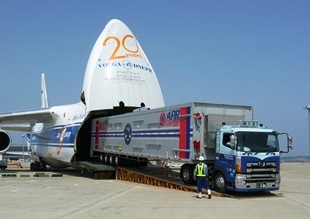

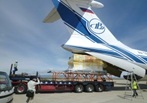
In 2011, we conducted the unloading of emergency power system transported by air to Chubu Centrair International Airport (total of five times).
TThis emergency power system was sent to supplement the severe power shortages resulting from the Great East Japan Earthquake. Loaded on the Antonov, the world’s largest cargo plane, this system was shipped from America and England and delivered to the Yokosuka thermal power plant.
The cargo plane used for this project was the AN-124. With a cargo bay length of 43.00m, width of 6.40m, and height of 4.39m, this massive plane has a maximum load capacity of 120 tons. The vision of the plane circling above the skies of the Centrair Airport before making its landing approach and finally landing on the runway was unlike that of any other aircraft. The event was marked by many spectators.
Resting at a specific aircraft parking apron, the front nose of the plane slowly rose to reveal its entire cargo bay. We slowly removed the power system loaded onto trailer heads and successfully transported the cargo to the Centrair Airport.



